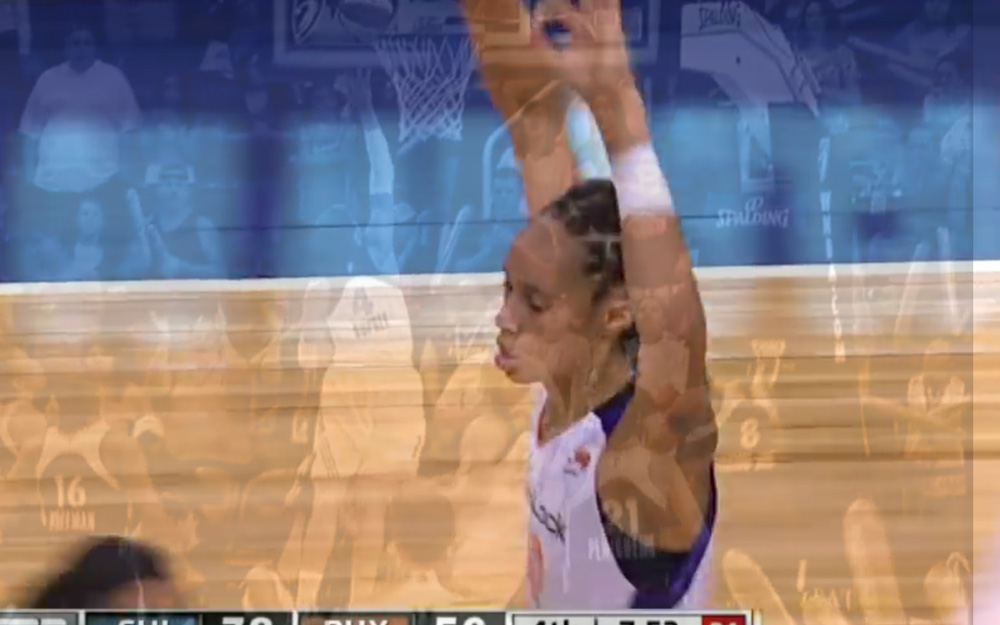Writer : Rick Kang
CN : Belinda Wong
说实话,也没多大的事儿,当初选用这个题目纯粹是因为看起来能激发大家的讨论而已(想拍板砖的,请轻一点)。好,回正题,WNBA说的是美国职业女子篮球联赛,赛事其实挺有水准的,女明星蓝球员们也很优秀,但是WNBA却不是很深入民心。正如题目所说的一样,到底这WNBA是怎么了?你和我对WNBA是不是有着什么偏见或是误解呢,看看你会不会有以下几项的想法吧。
Nothing, really. I just chose that title because it seemed provocative. The truth is, the WNBA and its stars are totally fine. But it does suffer from an image problem – one that article titles like mine do little to diminish. So perhaps it’s time to put my own prejudices to the test and see just how true (or false) my perceptions of the WNBA actually are.
English continued after Chinese >>
1. 没人看WNBA
至少我是这样想的。身为一个加拿大人,看到WNBA比赛的收视率比那些教人烫发或者小狗表演的节目要低得多而感到惊讶(这在加拿大很常见)。所以嘛,就会想女球员打篮球应该没那么精彩吧?
大错特错。事实上,WNBA的收视率在2012年上升了28%。在ESPN2频道播出的WNBA 2013年赛季,单单在美国就有超过23万的观众收看,比在ESPN和ESPN2两个频道播出的美国足球联盟常规赛的收看人数更多(平均22万观众收看)。
不得不提的是,大多数的体育比赛项目的观众人数一般只有在播出季后赛的时候才会增加,可是WNBA的决赛平均会吸引34万4千名观众收看,这比NCAA的Frozen Four冰上曲棍球比赛(有30万1千名观众收看)和ESPN2播放的美国网球公开赛(有29万名观众收看)的收看人数要多。可是,根据WTA打的宣传和市场推广,他们的网球比赛理论上是“女性运动欢迎榜”上排名 #1 的运动项目了,实际上却比WNBA的收视率还少。所以说,看WNBA的人多着呢。
2. 爷们都不看WNBA
有趣的是当我以为大部分男士都不会理WNBA的时候,事实却恰好相反,多数看WNBA比赛的反而是男士,而且当中接近有一半的观众是美国黑人。 2010年有个研究(Scarborough Sports Marketing)说看NBA男子篮球比赛的观众中,美国黑人只占8.5%,貌似WNBA对爷们,尤其是热爱篮球运动的美国黑人们更有吸引力?
3. WNBA的球员都是蕾丝边
或许这个只是少众的想法,不过我觉得有不少人曾经或者仍然觉得有很多女性职业运动员都是蕾丝边,然后我想说的是“那又怎样呢?”
球员的性取向有时会引起一些社会的争论,使联赛举办单位不停地处理相关的纷争,很多时候都忙得焦头烂额地 。就以NBA的Jason Collins为例子,当这位在NBA坐了12年冷板凳,连正式的NBA球员身份都没有的Jason在上个暑假公开他同性恋的取向时,舆论都炸开了锅。大家的焦点都放在了一件与个人球技或团体表现没有直接关系的事情上,忘记了联赛的根本——篮球。类似的事情在WNBA里却有完全不同的处理手法。在WNBA,是有球员公开自己是同性恋者的身份,但是这不会妨碍联赛赛会、各个球队、队员和观众欣赏和认可球员们的个人才华和表现。Brittney Griner就是其中一位公开了个人取向的女球员,但她的性取向从来都不是众人的焦点,她在WNBA里依然是各球队的No. 1 争夺对象。这说明WNBA是大家拼硬实力的地方,其他什么叽叽歪歪的都靠边去,比不少男子运动项目更“爷们”。
4. WNBA的球赛很无聊
我几乎可以肯定有许多的男人都这样想过,老实说,我也曾经有过这样的想法,觉得女生打篮球很无聊,没有人会看啦。可是这不对啊,有很多职业女球员都在场上发光发热,打得毫不逊于NBA联赛里的男球员。年轻一辈的Candace Parker, Maya Moore和Skylar Diggins有实力,有风格;还有其她球场明星Tina Thompson, Diana Taurasi和Sue Bird等等,都证明了篮球和球员的性别没有关系,重要的是对篮球和球场的热爱。不论男女老少,每一名球员都有可能在球场上独当一面,例如能跳射、得分、封杀、防守、传球等等,既有各自的位置和任务,又强调团体合作,大家各显神通,尽情享受打篮球的乐趣,发挥自己的才华和潜能。
当然,如果你是那种只看统计数字,不关心真实情况的人,你看了2013年的篮球联赛统计数字以后,应该会觉得WNBA打的比赛没有NBA里的打得好。一般来讲,大家看球都喜欢看进球的刹那,比赛队伍的进球率(进球数/失球数)越高,那么看起来就越带劲儿。而WNBA队伍的平均进球率是39%,比NBA队伍平均45%(对,没有搞错,这数已经把东岸的烂球队都加进去了)的进球率要低。连在NCAA第一组别男子篮球的队伍都有平均43%的进球率。
就以进球率而言,女生的失球数是比较多,可这个理由不足以解释为什么大家对WNBA的印象不好,甚至是不看WNBA的理由。如果你有看过男子篮球比赛“Big East”或者“Big 10 NCAA basketball”的话,再拿一场WNBA的比赛对比对比,然后你能还坚定地说WNBA无聊,朋友,你那浮动的评分准则就浮动得有点浮夸了。是WNBA,或NBA也好,里面的三分球,都是要在三分线那块地方投球的,女的、男的、男的、女的,球员们打的同样是篮球,观众看得同样刺激。所以,与其用“好”和“坏”来区分NBA和WNBA,倒不如直接欣赏两者各有的特色吧。
最后,循例声明一下,我不反对或否定你对WNBA和NBA的任何看法,我只是单纯地说说自己的看法而已。又或许,我们这比较其实挺多余的,为什么要比来比去呢?就好像你没办法很客观地比较“Biggie Smalls”和“Tupac”,或“A$AP” 和 “Wu Tang” 一样,大家看球就好了。
那么WNBA是怎么了?大家不用担心,真的没什么问题,女球员们打的是篮球,我们知道她们不是LeBron, Kobe和Durant,但是在新力军Elena Delle Donne, Brittney Griner和Skylar Diggins等明日之星的带领之下,我们可以预见WNBA会变得越来越好。
English continued below >>
1. No One Watches the WNBA
That’s what I thought, anyway. As a Canadian, it doesn’t surprise me when curling or dog shows draw more viewers than the NBA playoffs (in Canada). So surely women’s hoops wouldn’t perform much better, right?
Wrong. The fact is, WNBA viewership numbers have increased by 28% from 2012. On average, the WNBA’s 2103 broadcasts on ESPN2 drew 231,000 viewers in America alone (an increase of 28% from the 2012 season). To add some perspective, that’s more viewers than the average Major League Soccer’s regular-season broadcasts on both ESPN and ESPN2 (220,000 viewers).
Furthermore, that audience only increased during the playoffs. The WNBA Finals drew an average of 344,000 viewers – numbers greater than the NCAA Hockey Tournament’s Frozen Four (301,000) or U.S. Open Series tennis events on ESPN2 (290,000). And WTA tennis is supposedly the #1 women’s sport (according to their own marketing, at least).
2. Men Don’t Watch the WNBA
Want to know something even more interesting? I assumed that most men don’t care about the WNBA – but that just isn’t the case. In fact, the majority of the WNBA’s audience is men – and nearly half of those men are African-American (interestingly, according to a 2010 study from Scarborough Sports Marketing, only 8.5% of the NBA’s fans are African-American).
3. WNBA Players are Lesbians
Okay, so this probably isn’t what most people believe. But I’m sure most people think that a high percentage of female professional athletes are lesbians. The real question here is, so what?
Yes, there are lesbians who happen to be WNBA players. Here the WNBA is far more progressive that any of its male sports league counterparts – because neither the fans, the teams, nor the players really care.
I applaud the way the WNBA handles the gay/lesbian issue – with a collective, great big yawn. Jason Collins, a 12-year NBA journeyman, came out last summer and it ignited a firestorm of discussion. (For the record, he still doesn’t have an NBA job). Meanwhile, Brittney Griner starred at Baylor before becoming the WNBA’s No. 1 overall pick that same year – and the issue of her sexuality (Griner is a lesbian) barely moved the needle.
4. WNBA Basketball is Boring
I’m sure a lot of guys feel this way. And since we’re being honest, I had to count myself in that number. But then I thought about what makes me love basketball as much as do. There’s not one single reason, but here are my most cogent beliefs:
• Basketball allows for spontaneous creativity within the context of the established confines of both the rules and the playing surface
• Every single player can perform every single action on the court (shooting, scoring, dribbling, defending, passing) – unlike baseball, football, hockey or European football. While individual players have different roles and positions, there’s no skill, movement or action that are exclusive to one specific position. It’s an equal-opportunity sport for all team members
• Individual artistry, expression and flair can also exist (and even thrive) within team-based success and values.
And that’s where my own reasoning did me in. None of these points revolves around gender – or even mentions it. After all, it’s not like women can’t shine as talented, flashy or skilled individuals. The style (and substance) of great young players such as Candace Parker, Maya Moore and Skylar Diggins (not to mention the sustained success of Tina Thompson, Diana Taurasi, Sue Bird and countless others) obviously say otherwise.
Of course, contrarians may argue that the WNBA is objectively worse than the NBA – statistically speaking, at least. So let’s examine the facts. In 2013, the average WNBA team’s field goal percentage (the amount of makes versus misses) was 39%. The average NBA team, on the other hand, shot field goals at a 45% clip (yes, that’s including the miserable Eastern Conference). In NCAA Division I Men’s Basketball, the average shooting percentage was 43%.
So based strictly on the numbers, women miss more shots than men. And at a macro level, it’s a lot more fun to watch makes than it is to watch misses. Which might explain why I don’t watch the WNBA. But is that necessarily a good reason? Or even a valid one?
Because if you’ve ever watched Big East or Big 10 NCAA basketball – specifically Wisconsin – then calling WNBA basketball “boring” is at least mildly hypocritical. Sure, WNBA players don’t have the superhuman athleticism of their NBA counterparts. Newsflash: few people on earth do. Just because men may be “better” at tennis or golf doesn’t mean that watching the women’s equivalent is any less exciting.
I believe that most people who make this argument have never even watched a half of WNBA basketball. Because if you did, you’d see that players still have to dribble, pass, rebound and shoot. Assists are still assists. Blocks are still blocks. Threes are still threes. Competition is still competition.
And if you’d open your eyes and mind long enough, you’d see that the same kinds of excitement that happens in the NBA – clutch shooting, startling passes and big-time blocks – also occur in WNBA games. Because in the end, they’re all still basketball games.
Perhaps the problem is framing these options as “better” or “worse” – rather than merely “different”. After all, there remains a large contingent of people who prefer college basketball to the professional version for myriad reasons I won’t get into here (alumni allegiance; “the players care more”; “it’s purer”*, etc.) – even though I feel the professional game is superior both in the level of play and the skill/athleticism of the participants.
* I put some of these points in quotes to signify that I don’t co-sign these beliefs, and broadly speaking, I find them lazy generalizations from people who don’t know anything about pro basketball – but I digress…
These NCAA aficionados aren’t wrong per sé. I just don’t happen to agree with them. And maybe that’s the case with the WNBA, too. Maybe, just maybe, it doesn’t have to be compared to anything else. See, men have this unfortunate, insatiable need to rank and categorize. How does Biggie Smalls, for example, compare to Tupac? Or A$AP to Wu Tang? Sometimes it’s as though we can’t let things exist without context. They can only have a place in relation to or with something else.
But not everything needs to be compared to something else – even if the two happen to be related. Yes, they play basketball in the WNBA. Yes, they play basketball in the NBA, too. But watching one shouldn’t diminish the other. “Better” is subjective; but “different” is fact. And, in the end, that is the WNBA’s crime – that they’re not men. Their sport, however, is still basketball.
So let’s not worry about what the WNBA isn’t – above-the-rim, high-flying dunks – and instead celebrate what it is: the best women’s basketball league in the world, where the best – with emerging sophomores such as Elena Delle Donne, Brittney Griner and Skylar Diggins leading the way – are only getting better. And the sooner we realize they’re not LeBron, Kobe and Durant, the better off we – and they – will be.





Speak Your Mind